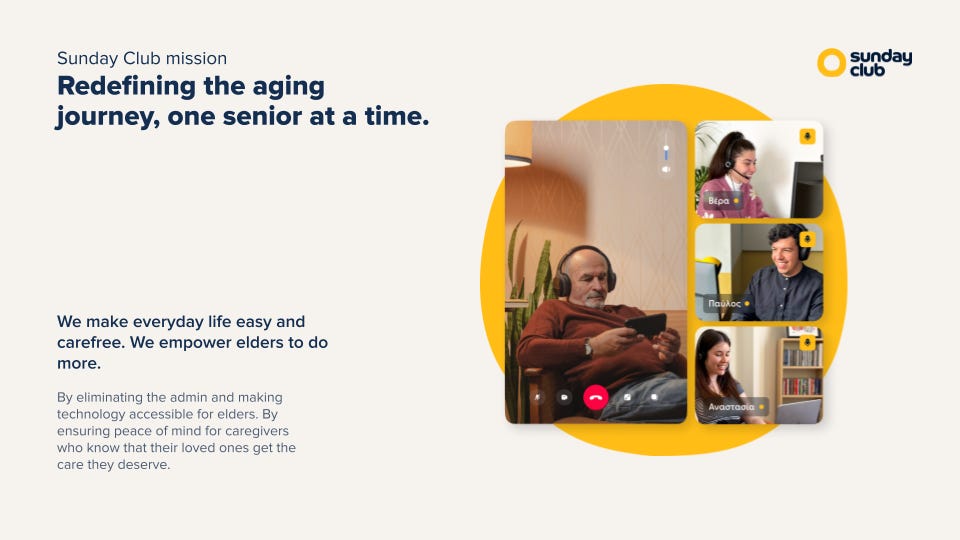Read This If You’re Launching a Startup in Elderly Care.
A Decalogue to Check Out—Mainly Born from Pitfalls.
Back in 2022, we launched our first venture as BORRN, Sunday Club, with the mission of Redefining the aging journey, one senior at a time. As we went through our entrepreneurial journey, we deeply explored a few other ideas to support people suffering from dementia. Unavoidably, along the way, we hit some major pitfalls, mistakes that became our biggest lessons. If you’re starting a venture in this space, here’s what we learned the hard way.
What’s Sunday Club.
Sunday Club was a subscription-based phone service for elderly people and their caregivers. Each elderly person was connected with a team member who assisted with daily practical needs such as technology help, bill payments, online shopping, and more. The service operated daily with unlimited call duration and frequency. Weekly check-ins are conducted to discuss additional ways the service can be beneficial. Sunday Club targeted two groups: active elderly individuals who use smartphones and want to simplify their daily routines, and those who need more support due to health issues like dementia.
Our Decalogue of Learnings and Tips.
The General ones:
Vision and Values: It’s a given that you should define your vision and values early. This is crucial for hiring and maintaining a cohesive team culture. But, it also serves as a guiding star during tough decisions and conflicts. When our team faced disagreements on product direction, having clear values helped us make decisions aligned with our mission.
Scalability: If you try to solve a big challenge for the elderly, such as dementia, which is affecting more than 50 million people globally today, scalability would be a big challenge, so tackling a big market from the get go is crucial.
Numbers matter: Conducting thorough surveys is critical. Even before launching, we surveyed three markets: Greece, the UK, and Spain to understand the potential market fit. Our stand-ups and reviews were guided by a dashboard filled with numbers and insights about our users. Data including for example the services they used most, effective Social Media campaigns, detailed feedback and comments, etc.
Team Collaboration and Ways of Working: Collaborating with different teams presented unique challenges, particularly as we brought industry experts on board to complement our business expertise. Initially, we encountered varying work styles and operational rituals. It took time and extensive discussions to meet in the middle and establish effective ways of working together. Prioritizing these efforts from the beginning is crucial to develop a unified approach that ensures all team members are aligned and can cooperate seamlessly.
Testing Period: Determining the right testing duration is challenging. Our experience showed that even a few months of pilot testing, while helpful, often left us questioning if we had enough time to fully understand and refine our service. It’s crucial to define clear metrics and success criteria upfront. Continuously evaluate these metrics to decide when your solution meets the requirements and is ready for full-scale deployment. This process ensures that testing is both comprehensive and efficient.
The Industry-Specific ones:
Health system: Navigate each market's health system by consulting with experts. Each country’s approach to health problems, such as dementia, vary greatly. For instance, in the UK, working with local boroughs is essential for dementia programs, whereas in the US, health insurance companies manage governmental funds for people suffering from Alzheimer’s disease. We were fortunate to have Notis Paraskevopoulos, co-founder of the Seveneleven Company with main goal the improvement of social and mental state of the elderly, to guide us through the Greek health system’s nuances.
Cultural Sensitivities: In Greece, where the family bonding is strong, we realised early on that there was an unspoken expectation from the parent that their kid would help them manage even the smallest daily things, such as downloading an email attachment for them, or showing them how to use Viber. This was a big barrier for a technological service for the elderly, because even though children were big fans of this service, their parents perceived the tech guidance as a precursor to retirement homes. Educating the elderly that this is not the case proved to be a big challenge for us.
Target Audience: We initially designed our service to assist elderly individuals through their children—millennials who could use phone services to help their parents with technology, bill payments, online shopping, etc. However, this approach wasn't very effective because the elderly didn't feel they chose the service themselves; they felt their kids were imposing it on them, leading to skepticism and resistance.
Choosing the Right Tool: We went for a phone-based service because it’s familiar and accessible to most elderly people. This decision was based on understanding our audience's needs and familiarity with tech. If your venture addresses elders, choose your technology wisely to ensure it is inclusive and accessible, avoiding the risk of excluding those who may struggle with more complex tools.
Regulatory Agility: Prioritize agility in navigating regulatory landscapes. Elderly care is heavily regulated, and laws can vary significantly between regions. Building a proactive approach to compliance and staying ahead of legal changes will safeguard your venture and accelerate its adaptation to new markets.
Despite the pitfalls, difficulties, and the fact that we ventured into uncharted waters, we loved interacting with customers and experts in this space and we would love to see more startups launching in elderly care. The road may be tough, but the impact you can make is immeasurable. If you have any questions or need further advice, don’t hesitate to reach out.




